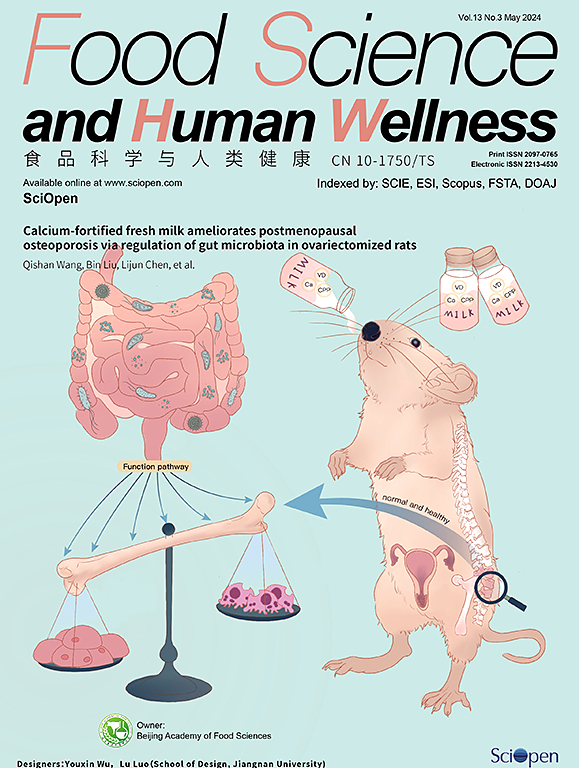Fufang E’jiao Jiang’s effect on immunity, hematopoiesis, and angiogenesis via a systematic “compound-effect-target” analysis
IF 7.4
1区 农林科学
Q1 FOOD SCIENCE & TECHNOLOGY
引用次数: 0
Abstract
Fufang E’jiao Jiang (FEJ) as a healthy food consisting of medicine food homology materials approved by China’s Ministry of Health has been extensively applied to replenish qi and nourish blood, and it has a positive impact on women’s health. To find out the material basis and mechanism of FEJ, a systematic “compound-effect-target” analysis including chemical composition resolution, zebrafish, network pharmacology, molecular docking, transcriptome, and bibliometric analysis was adopted. 124 chemical components including ginsenosides, and phenylethanoid glycosides in FEJ were discovered, and effects of FEJ on promoting the generation of immune cells, erythropoiesis and angiogenesis in zebrafish were exhibited. Based on network pharmacology, molecular docking and in vivo activity assay, 6 compounds including jionoside A1, isoacteoside, echinacoside, acteoside, lobetyolin, and rehmannioside D were identified as active components of FEJ. Transcriptome data showed that several pathways such as complement and coagulation cascades, ECM-receptor interaction, and PI3K-Akt signaling pathway were associated with proangiogenic effect of FEJ. 19 common targets were obtained through combined analysis of network pharmacology and transcriptomics, and 5 targets of them were verified by PCR. The bibliometric analysis of these common targets revealed that FEJ was related to energy metabolism, pathway in cancer, etc., which was consistent with the results of network pharmacology and transcriptome. The studies suggested that FEJ could replenish qi and nourish blood through multi-compound and multi-targets.
通过系统的 "复合效应-靶标 "分析,了解扶芳二条姜对免疫、造血和血管生成的影响
馥芳娥娇姜作为中国卫生部批准的药食同源健康食品,在补气养血方面得到了广泛应用,对女性健康产生了积极影响。为探明人参皂苷的物质基础和作用机理,采用了化学成分解析、斑马鱼、网络药理学、分子对接、转录组和文献计量学等系统的 "化合物-效应-靶标 "分析方法。发现了 FEJ 中包括人参皂苷、苯乙醇苷在内的 124 种化学成分,并展示了 FEJ 促进斑马鱼免疫细胞生成、红细胞生成和血管生成的作用。基于网络药理学、分子对接和体内活性检测,6 个化合物,包括琼瑶苷 A1、异内酯苷、棘鲷苷、放线菌苷、龙脑香苷和雷曼薯蓣皂苷 D 被鉴定为 FEJ 的活性成分。转录组数据显示,补体和凝血级联、ECM-受体相互作用和 PI3K-Akt 信号通路等多个通路与 FEJ 的促血管生成作用有关。通过网络药理学和转录组学的联合分析,获得了19个共同靶点,并对其中的5个靶点进行了PCR验证。对这些共同靶点的文献计量分析表明,FEJ与能量代谢、癌症通路等有关,这与网络药理学和转录组学的结果一致。这些研究表明,FEJ 可通过多化合物和多靶点来补气养血。
本文章由计算机程序翻译,如有差异,请以英文原文为准。
求助全文
约1分钟内获得全文
求助全文
来源期刊

Food Science and Human Wellness
Agricultural and Biological Sciences-Food Science
CiteScore
8.30
自引率
5.70%
发文量
80
审稿时长
28 days
期刊介绍:
Food Science and Human Wellness is an international peer-reviewed journal that provides a forum for the dissemination of the latest scientific results in food science, nutriology, immunology and cross-field research. Articles must present information that is novel, has high impact and interest, and is of high scientific quality. By their effort, it has been developed to promote the public awareness on diet, advocate healthy diet, reduce the harm caused by unreasonable dietary habit, and directs healthy food development for food industrial producers.
文献相关原料
公司名称
产品信息
索莱宝
Pronase E
阿拉丁
Phenylhydrazine
 求助内容:
求助内容: 应助结果提醒方式:
应助结果提醒方式:


